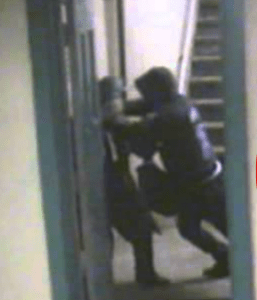As reported on TechCrunch.
by JOHN BIGGS

As we move closer to the launch of the (probably awful) Facebook phone, let’s examine just what the social network and its ilk have created. Millions of us use these new tools to joke, flirt and share memories, but just as many of us use these tools much to our disadvantage. In some ways, however, that is making things better for all of us.
This morning Gawker posted surveillance video of a terrible mugging that took place not far from my home in Brooklyn. The video (don’t watch it, it’s not important here) clearly showed the victim going down the stairs and then the attacker coming up behind her wearing a hoodie emblazoned with the Alpha Phi Delta insignia, the nickname “Stugotz” (Italian slang for “dick”) and the number 27. There were a few more clues as to the mugger’s identity, but those were the major ones. The woman sustained minor injuries, according to Gawker, but the attack was particularly jarring and disgusting.
Minutes after the Gawker post hit, a reader found this Facebook page. It was all there: the hoodie, the logo, a set of keys, a purple bracelet, and the thief’s yutzy mug preening from a set of clear Facebook photos that could have come right from the “how not to be a frat boy who mugs people” playbook. Today Stugotz, aka Aidan Folan, 21, was taken into custody in Brooklyn.
Aren’t we lucky, then, that this idiot shared his information with such abandon? The average person, myself included, wouldn’t see Folan’s Facebook account as very unique at all. It’s a dossier of a life that apparently led him to rob and beat a woman on the subway. If this had been any other 21-year-old, Folan’s photos of himself cavorting with his friends and calling out his bros in the frat would be absolutely normal. But these are the posts of a criminal, and of late we’re seeing more and more of this.
 We’re entering a new era of documentation. In the hours after the Newtown shootings, we found ourselves clicking on links purporting to connect us to the shooter’s Facebook page. Police routinely use Facebook and other social posts to catch criminals stupid enough to snap themselves with the phones of their prey.
We’re entering a new era of documentation. In the hours after the Newtown shootings, we found ourselves clicking on links purporting to connect us to the shooter’s Facebook page. Police routinely use Facebook and other social posts to catch criminals stupid enough to snap themselves with the phones of their prey.
Internet vigilantism isn’t new, and this isn’t what I’m on about here. This is about the dangers of exposing yourself too much in one way – in the case of the PyCon debacle two weeks ago or this dark other way. Is it right and good that Folan should be called out and caught for his misdeeds? Absolutely. But taken to the other extreme, these same tools can be – and are – used against the innocent.
It’s easy to write a jeremiad against oversharing in the social era. It’s been done before and will be done again. However, as we watch fools and villains hoisted on their own petards again and again, why can’t we learn something? Why can’t we treat Facebook like a mini social club where our relationships are splayed flat and squirming in other people’s browsers. Or, more important, why do we?
These questions will be answered by us all over the next few decades. Once we realize that our online presence is as palpable, in the end, as our physical one, I suspect more of us will pull back. I’ve already started slowing my sharing, opting instead for private sharing with my family and some jokes on Tumblr. I want idiots like Folan to be exposed, and it pleases me to no end to see him get his comeuppance. But the sword cuts both ways.
In a way it’s good that the social animal is so persistent within us. It lets fools be foolish on a big stage, and when they hurt someone it lets vigilante justice roll over them. But, at the same time, we are not always fools nor are we always foolish. Sometimes being the social animal is a detriment. It’s up to us to know when.